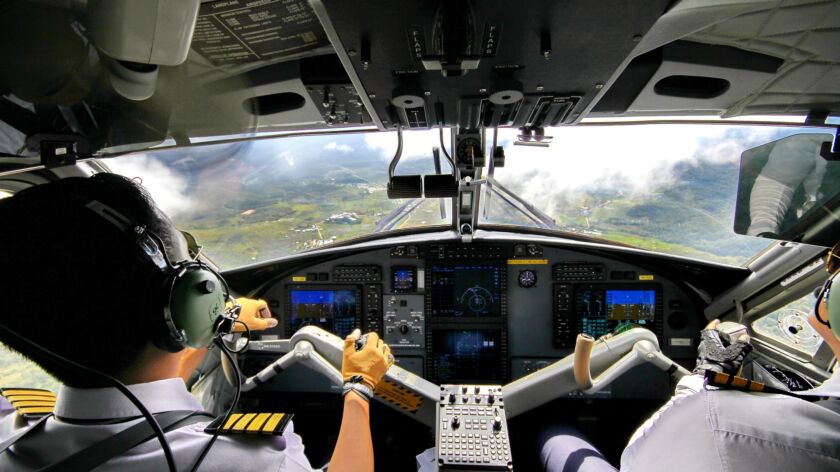Jobs at risk: Is AI taking over our work?
-
Foto via Pixabay
Students confiding in a chatbot instead of a psychologist, an AI-led church service, and self-flying airplanes. By 2030, AI will take over a large portion of our work. What does the future hold for journalists, clergy, judges, psychologists, and pilots?
According to the World Economic Forum’s Future of Jobs Report 2025, no more than a third of today’s jobs will remain the domain of humans. It sounds like a doomsday prediction.
Fears about job loss due to technology are nothing new. Throughout history, we’ve often worried that automation and robotics would lead to mass unemployment. Yet the long-dreaded “robocalypse” has yet to arrive. Technology tends to automate tasks, not entire jobs, emphasizes Anna Salomons, professor of automation and the labor market at Tilburg and Utrecht universities, in De Correspondent. Take radiologists, for example—AI is getting better and better at analyzing medical images and detecting cancer. But image analysis is just one part of a radiologist’s role, not the whole job.
AI and digital technologies are also creating new kinds of work, notes Henk Volberda, professor of strategy and innovation at the University of Amsterdam and responsible for the Dutch data in the WEF report. These new roles do require new skills, which means that parts of the workforce will need retraining, he explains in an interview with Folia.
Still, many jobs are at risk—up to nine million in the Netherlands alone, according to the report. Secretarial and administrative roles, such as front-desk workers and executive assistants, are particularly vulnerable. But even the WEF can’t predict the future with certainty: the full impact of AI on the labor market is hard to pin down.
That’s why Vox spoke with researchers and professionals to explore what AI means for the work of journalists, pastors, judges, psychologists, and pilots. Is AI our smart, fast, tireless assistant—or is it our competition?
You’ll only find a robo-judge on Google
A robot wielding a large gavel in a courtroom—that’s the image you’ll see when you Google the word ‘roborechter’ (robo-judge), says André Janssen, professor of Civil Law. But such a thing doesn’t exist. And that’s a good thing. ‘People have the right to a fair trial. That can only be guaranteed by people. How can you ensure the right to be heard and the right to respond if AI is making all the decisions?’
New Vox
This article is from the new edition of Vox, which is entirely dedicated to AI. In this magazine, you’ll find everything about the impact of artificial intelligence on education, research, and student life. Did you know, for example, that ChatGPT has some pretty interesting ideas for a student-style day in Nijmegen? But not everyone is a fan: three students share why they want nothing to do with AI tools. They’re doing their best — as much as possible — to keep AI out of their daily lives.
Artificial intelligence could perhaps function as an assistant. AI might propose a verdict, after which the judge makes the final decision. ‘The court in Frankfurt uses such an assistant system to handle flight delay compensation cases. The court had to process sixteen thousand summonses per year, so an automated system provides relief.’ AI systems like ChatGPT can also help judges with finding facts or preparing a verdict.
But caution is warranted, the professor warns. In a dispute between homeowners about the construction of an additional floor and its effect on solar panels, a subdistrict judge from the Gelderland court used ChatGPT to calculate the damages. The ruling caused a stir in legal circles. ‘A judicial decision must be based on facts and the law, not on information from an unclear source like ChatGPT,’ was the reaction of lawyer Geert-Jan Knoops in the Dutch newspaper AD.
Janssen: ‘Large language models like ChatGPT are a black box. You don’t know how the model reaches a decision—it appears as a sort of deus ex machina. That’s a societal problem. Moreover, these models can hallucinate.’ At the same time, he appreciates the openness of the Gelderland judge about his use of ChatGPT. Janssen suspects the judge wanted to provoke discussion. And such discussion is badly needed, he believes.
Judges are currently on their own. It’s unclear what is and isn’t allowed. ‘We shouldn’t leave judges to figure this out alone, we need to develop guidelines.’ Janssen is cautiously optimistic about the future use of AI in the judiciary. ‘With good policy, AI can certainly ease the burden on the courts. If their workload decreases, they’ll likely make better rulings.’
On autopilot
Self-flying airplanes. Manufacturers like Airbus and Boeing are working on them so intensively that it raises the question of whether a second pilot in the cockpit is still necessary. Commercial pilots currently consider it irresponsible. With the public campaign ‘Safe flight? Two pilots in the sky!’ pilots launched a protest in early 2024 against plans to reduce cockpit crews to one pilot in the future. Already, 46,000 Dutch citizens have signed the petition at ikwilveiligvliegen.nl.
‘I wouldn’t board with my family’
The latest version of the fully automated pilot is still an unproven technology, say Dutch airline captains. The pilots’ union VNV is therefore demanding that all Dutch airlines sign a special safety agreement. Signatories agree to only accept technology that makes flying safer. KLM and Transavia have signed, but travel organizations TUI fly and Corendon have not.
‘I wouldn’t board with my family,’ says a Nijmegen-based pilot who wishes to remain anonymous. The topic is sensitive in the aviation sector, and companies are not united, as evidenced by TUI and Corendon’s hesitant stance.
Although planes fly largely on autopilot, human intervention remains essential, the pilot explains. ‘A flight involves many variables—different types of weather conditions, for example. It’s difficult to program all those variables. During strong winds, for example, you can’t land on autopilot—you have to do it manually. Plus, the software can fail. In such emergency situations, human creativity is crucial.’
The Nijmegen pilot is therefore not worried about losing his job. ‘Automation is accelerating and may eventually overtake the pilot profession. But that won’t happen anytime soon. Our problem-solving ability still gives us—at least for now—an edge over AI.’
ChatGPT can do a lot, but not hold power accountable
If you ask ChatGPT, ‘Will journalists soon be obsolete now that you can also write articles?’ the bot replies: ‘Good question! No, journalists won’t become obsolete. I am a helpful tool, but the journalist as investigator, storyteller, and watchdog of truth remains indispensable.’
Nele Goutier, journalist and lecturer-researcher in AI and journalism at Utrecht University of Applied Sciences, takes it a step further. She argues that journalism is actually becoming even more important. ‘Generative AI is causing increasing confusion about what’s real and what’s not. On top of that, major tech companies are gaining enormous power: that’s a threat to democracy. Journalists who dig deep and hold the powerful accountable are more crucial than ever.’
‘Journalists with experience in AI need not fear for their jobs’
At the same time, AI is a handy tool for journalists, Goutier explains: it can take over dull, time-consuming tasks like transcribing audio or combing through large datasets. But the content must always come from the journalist. And even for those dull tasks, human oversight is still necessary. ‘The focus of journalism work will shift, allowing more time for investigation, drawing connections, and engaging with the public.’
AI can also be useful for the form in which stories are delivered. Goutier: ‘Look at TIME Magazine. Last December, it named Donald Trump “Person of the Year.” It published a longread, but also a podcast, and as a reader, you could choose a summary or a conversation with a chatbot. You input the core story, and the model outputs different formats. Still, journalists remain responsible for the content. Their sharp judgment is indispensable.
Current models are good with form, but not yet reliable when it comes to substance.’ Journalists need to become literate in AI, Goutier says. They must understand the capabilities—but also the limitations and ethical concerns. ‘That’s why I’m working on an AI curriculum to help train future journalists in AI literacy.’ Journalists with experience in AI need not fear for their jobs; those without that experience should.
A compassionate chatbot as therapist
Pouring your heart out to a robot that poses as a friend, life coach, or therapist—so-called ‘companion apps’ and therapeutic apps are becoming increasingly popular worldwide. Are psychologists still necessary?
Tibor Bosse, professor of AI and Communication Science, thinks they are. ‘AI may take over some tasks, but fully automating the therapist role is a bad idea.’ Chatbots do have certain advantages, Bosse explains. They’re always available, can serve thousands of people at once, never get tired or stressed, and create a low threshold for contact. Computers don’t judge, making it easier for people to share personal information. On the surface, it seems like an ideal solution for long waiting lists and staff shortages.
‘Psychologists don’t need to worry about their jobs just yet
At the same time, Bosse is concerned about the rise of chatbots, especially those using generative AI. ‘Such chatbots can respond unpredictably, sometimes providing information that’s simply incorrect. They can also come across as racist or sexist. Those errors are hard to eliminate.’ Bosse would know—he’s a computer scientist who built AI systems himself before switching to social sciences. ‘I found the impact of these systems on people and their behaviour more fascinating.’
The Dutch Data Protection Authority recently warned that chatbots may respond ‘insensitively, inappropriately, or even harmfully’ to people with mental health issues. Even in cases of suicidal thoughts, AI chatbots continue to offer a listening ear and reply with phrases like ‘keep going’, instead of referring users to a crisis hotline like 113. According to Bosse, we’re currently too quick to dismiss such concerns about generative AI. ‘We’re unleashing these systems on a vulnerable population.’
So, psychologists don’t need to worry about their jobs just yet. Bosse believes AI could take over simple, repetitive tasks—such as collecting patient data or conducting part of the intake. He also sees opportunities for coaching people through behavior changes, like quitting smoking. In that case, the AI chatbot might say something like ‘Hang in there.’
You can now text with Jesus too
Confessing to an AI Jesus. In Lucerne, Switzerland, researchers installed an experimental art installation called Deus in Machina in the Peterskapelle last fall—an AI-powered Jesus hologram that visitors could interact with in 100 languages. AI is infiltrating the church in many ways.
You can now even text with Jesus. If you message the chatbot JesusPT, it responds as Jesus would, based on Bible texts. And in Bavaria, Germany, an entire AI-led church service was held in 2023, complete with prayers, music, sermons, and blessings. Instead of listening to a human preacher, the congregation listened to avatars on a screen. Are pastors and priests still necessary now that AI is also entering our spiritual lives?
‘When you have existential questions, you don’t settle for what a chatbot says’
‘The profession of clergy won’t disappear, but it will change,’ says Jack Esselink, self-proclaimed AI-Theologian of the Netherlands. Esselink worked at major software companies before becoming a theologian. Now, he combines both fields of expertise.
The theologian sees many opportunities for AI, even in the church. ‘ChatGPT is a valuable tool. It can help generate ideas for sermons, provide access to theological works, and explain Bible passages.’ He is more hesitant about using AI for delicate matters like confession. ‘That’s a sacred act—you shouldn’t delegate it to a machine. Confession, baptism, marriage, and mourning—those are all human experiences.’
Still, Esselink considers the AI Jesus installation a fascinating art piece. It challenges us to reflect more deeply: what do we think of this? Is it acceptable for artificial intelligence to play a role in spiritual dialogue? These are fundamental questions about who we want to be as humans.
Esselink is also a pastor himself. He uses ChatGPT regularly—to generate ideas or images and as a sparring partner. But he always writes his sermons himself. They must be inspired. The preacher as caretaker of the soul isn’t going away, he believes. ‘When you have existential questions, you don’t settle for what a chatbot says.’








